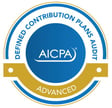Employee Benefit Plan Audit Services
GBACO are Members of the American Institute of Certified Public Accountants' (AICPA) Employee Benefit Plan Audit Quality Center (EBPAQC), which provides extensive research for any areas that may affect any given Plan audit.
GBACO has chosen to focus a significant amount of attention in this area, with 15+ years of experience performing 6+ benefit plan audits annually.
Since joining the program performing employee benefit plan audits;

Steve is one of our firm’s newest audit partners. He's been with the firm since 2001, and functions as one of the firm's quality control partners.
Steve oversees our ERISA (employee benefit plan services) practice.

Dan is our Audit and Quality Control partner, an active member of the AICPA and PICPA, and oversees our ERISA (employee benefit plan services) practice.

Matt was promoted to Manager in the Audit and Accounting Department in July 2015. He provides auditing services to clients in a variety of industries. However, he specializes in ERISA plan and HUD audits.
Matt has completed the “Advanced Defined Contribution Plans Audit" certification from the AICPA.

Have Questions or Comments?
Get in touch with our Employee Benefit Plan Audit Team.  ,
, 
or call us at 412-885-5045.
We're here to help!
Under ERISA, employers are not required to create a retirement plan, however, those that do must meet certain minimum standards.
Click here for Retirement Plans and ERISA FAQs provided by the DOL.
According to Plansponsor.com, after...
"Automobile manufacturer Studebaker Corp.’s plant-closure and default on fulfilling pension benefit obligations to many of its employees—leaving them just a fraction of what they had been promised, or even nothing—was seen as so egregious that the “Act to provide for pension reform” (the long title of the bill) received wide bipartisan support. After coming out of the Joint Conference Committee, and having been initially passed by significant majorities, the combined legislation was agreed to by the House on August 20, 1974. The vote was 407–2; it was unanimous in the Senate two days later." Read more about the history of ERISA.
3325 Saw Mill Run Blvd | Pittsburgh, PA 15227-2736| Phone: 412.885.5045 | Fax: 412.885.4870
2014 Goff, Backa, Alfera & Co, LLC